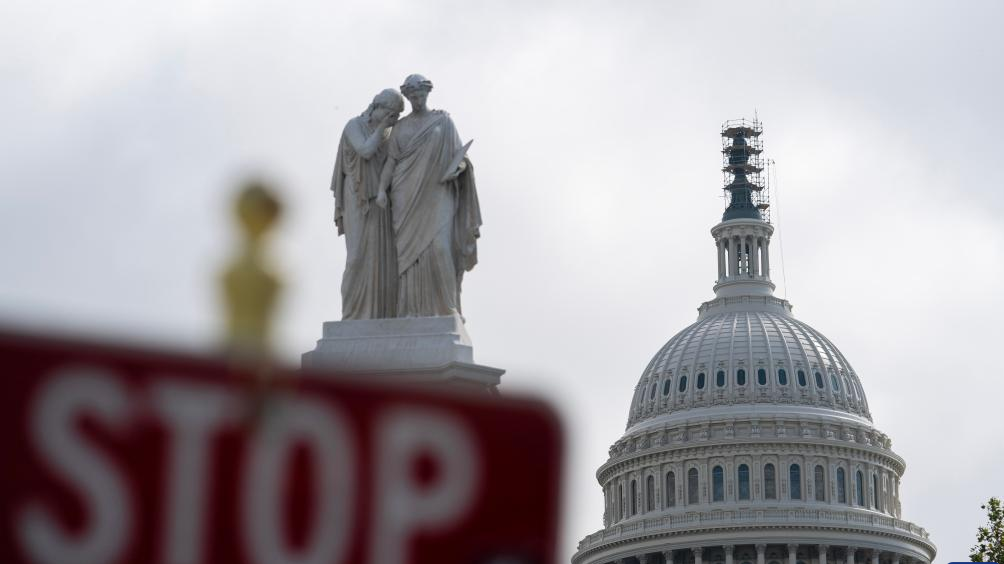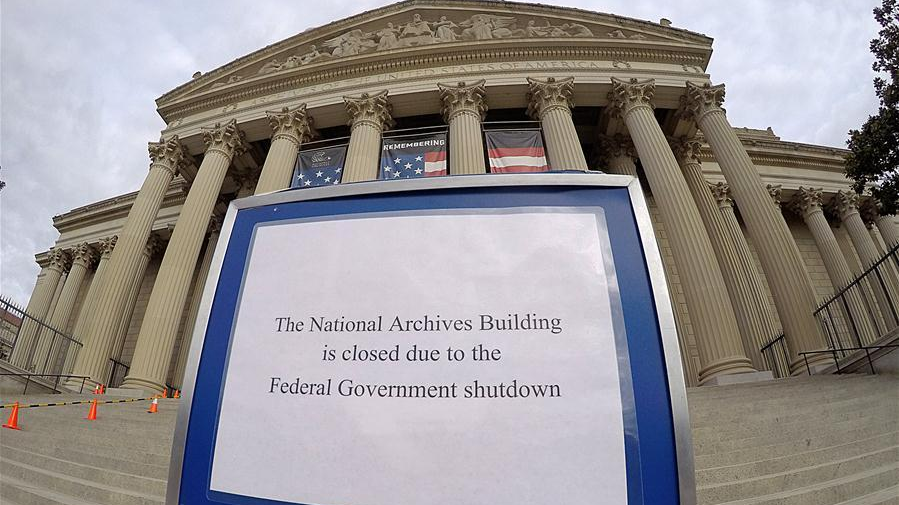
The U.S. Capitol building in Washington, D.C., U.S., September 28, 2023. /Xinhua
The U.S. Capitol building in Washington, D.C., U.S., September 28, 2023. /Xinhua
Editor's note: Daryl Guppy, a special commentator on current affairs for CGTN, is an international financial technical analysis expert. He has provided weekly Shanghai Index analysis for mainland Chinese media for more than a decade. Guppy appears regularly on CNBC Asia and is known as "The Chart Man." He is a former national board member of the Australia China Business Council. The article reflects the author's opinions and not necessarily those of CGTN.
The U.S. government was on the verge of a shutdown last week as Congress struggled to reach a deal to keep agencies running. Later the bill passed the Republican-led House of Representatives after House Speaker Kevin McCarthy defied an earlier demand by party hardliners for a partisan approach. U.S. President Joe Biden signed into law the stopgap bill on September 30 to extend government funding for 45 days, averting a federal shutdown with just an hour to spare.
The new approach would leave behind aid to Ukraine – a White House priority opposed by a growing number of Republican lawmakers – but increase federal disaster assistance by $16 billion, meeting U.S. President Joe Biden's full request.
The entire process is a shambles, but more importantly, the world seems not to care and that reflects a significant decline in the status of the United States. The repeated squabbling around the debt ceiling is a farce that diminishes the credibility of the United States.
In September 2013 the U.S. went into a 16 day shutdown. At the time, I was doing interviews with the American business TV channel, CNBC Asia. The shutdown was big news, and the longer it dragged on, the greater the impact on financial markets. It goes too far to describe this 2013 shutdown as a crisis, but there was certainly deep concern.
By 2018 the U.S. was already well-versed in the bickering and partisanship that has come to define recent American politics. In December 2018 federal government payments were halted for a whopping 34 days. It took away the Christmas cheer for thousands of federal government employees and shut down national parks. Unlike the 16-day shutdown in 2013, this was initially viewed as an irritation rather than a crisis. The S&P 500 fell, and eventually it became more than a stumble but it was quickly followed by a strong rebound when funding was restored.
Former U.S. President Donald Trump's administration saw multiple repeats of the ritual refusal to raise the debt ceiling, and each time, at the last minute, a solution was found. In a nation addicted to debt, there is never really any doubt that the debt ceiling will be raised eventually. The real interest is in the compromises that have to be made to get the ceiling raised.
This time seems a little different with two sets of hardball in play. The first hardball is between the Republicans – who still believe the election was stolen from them – and the Democrats. The second hardball play is within the Republican party itself. Speaker of the House, Kevin McCarthy sits there only after 15 exhausting rounds of voting over four days before he won. He suffers an unstable majority and a tenuous hold on power within the Republican party. His right wing Republican party opponents delivered a reluctant compromise.

A sign indicating that the National Archives Building is closed due to the federal government shutdown is seen in Washington D.C., U.S., January 22, 2018. /Xinhua
A sign indicating that the National Archives Building is closed due to the federal government shutdown is seen in Washington D.C., U.S., January 22, 2018. /Xinhua
For many outside observers, this is a continuation of the kindergarten-style politics that has plagued the United States since the election of former President Barack Obama and the "birther" conspiracy promoted by Trump and others which alleged that Obama was not a U.S. citizen. Trump plunged politics to new depths and the world grew weary of the internecine bickering. These U.S. political antics were once viewed with benign amusement but are now considered with concern and contempt.
And that leads to the current situation where the U.S. was facing yet another government shutdown for potentially an extended period. The world is weary of these antics, although alarmed at the collateral damage it can cause in terms of interest rates and inflationary pressures.
The analysts on the television business channels no longer talk breathlessly of an economic crisis in response to the repeated failure to raise the debt ceiling. Nobody really cares and for a country with aspirations to be the world leader in all things, that is an unwelcome insult.
That is not to say these antics can be completely ignored by the rest of the world. After all, the U.S. is in debt to nations around the world who hold U.S. treasury bonds. Shutdowns, real or threatened, increasing debt ceilings and the potential inability to pay all raise the spectre of a default. Once unthinkable, it cannot now be dismissed entirely because former President Trump raised the prospect.
A default is illegal under the terms of the U.S. Constitution but that's not necessarily a barrier. The 1977 International Emergency Economic Powers Act grants the President the power to block "transfers of credit and payment" to any country representing an "unusual and extraordinary threat." Congressional approval is not required. These are the sanctions that prevent the new government of Afghanistan from accessing funds held in U.S. banks. These are the sanctions that prevent governments the U.S. does not like from having access to their funds, private and governmental, held in the U.S.
Desperate governments do desperate things and governments riven by squabbling do not care about credibility, so the farce grows.
(If you want to contribute and have specific expertise, please contact us at opinions@cgtn.com. Follow @thouse_opinions on Twitter to discover the latest commentaries in the CGTN Opinion Section.)